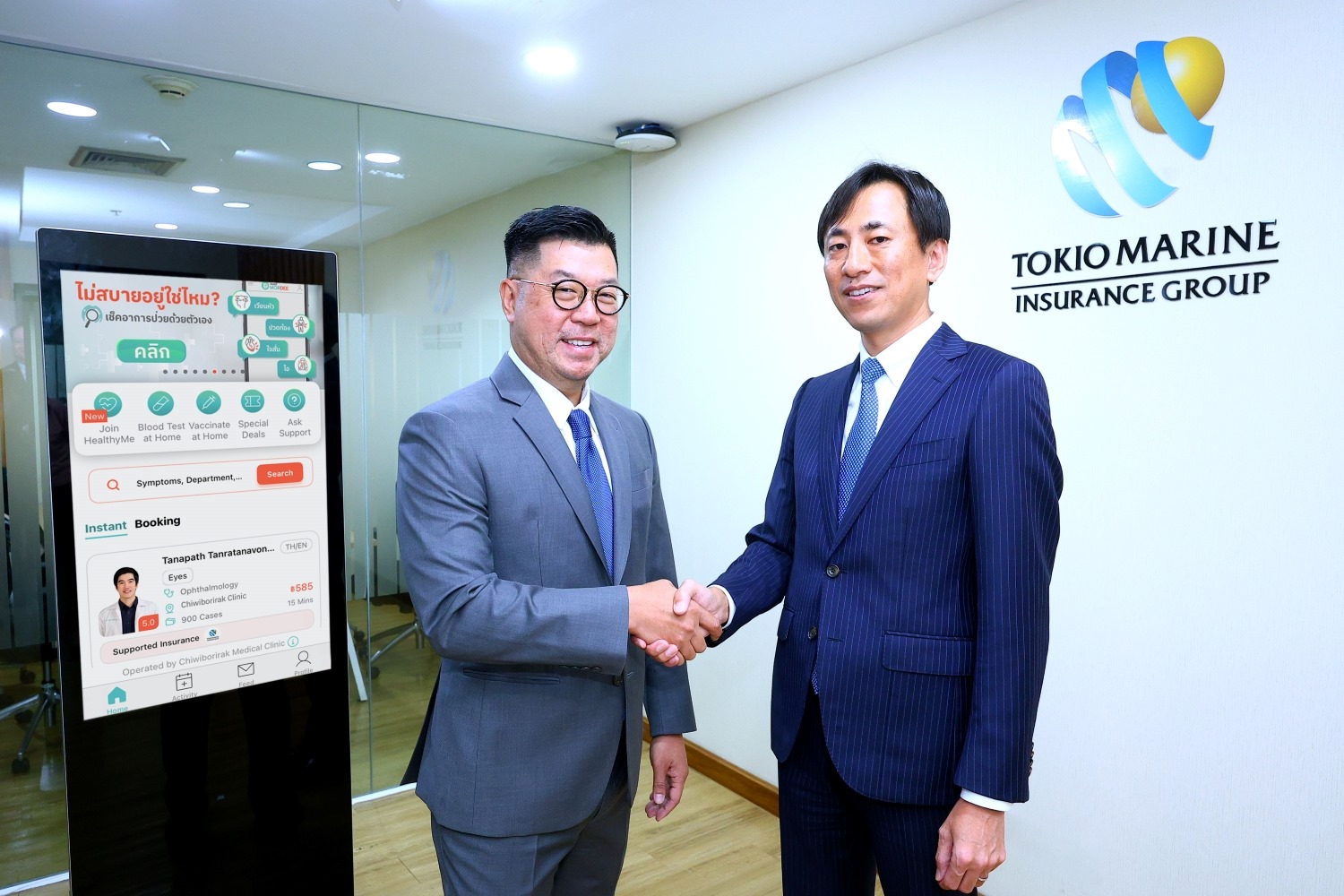“When I went to a hospital, I used to see plenty of people my grandparents’ age lying down on hospital floors. Apparently, they must have got sleepy after traveling a long way from provinces just to see a medical specialist,” Dr. Yosavee Niranvichaiya, who has studied engineering, recounted, “That’s when I thought technology should be leveraged to improve Thailand’s healthcare system”.
With a keen interest in the business world, Yosavee started his career at SCG. He initially worked for supply-chain process development. But after he received a scholarship to study finance and marketing at the Northwestern University’s Kellogg School of Management in the United States, he stepped closer to business administration. Upon his return, he was assigned to handle merging and acquisition (M&A) at the time SCG’s investment focus shifted from commodities to high-value added products. As his experience grew, he took charge of the company’s venture capital or the mission of finding promising clean-technology startups.

“Thanks to my job at SCG, I foresaw future technologies or what would be coming in the next 10 years. It’s as if I rode a time machine into the future,” Yosavee said, with his words reflecting his tech passion. While he immersed himself in the realm of startups, his wife was based at a hospital. The common scenes at her hospital made Yosavee see “opportunities” to start a business that could also solve social problems. With that in mind, he and three other friends co-founded “Chiiwii” in 2016. Their venture is arguably Thailand’s first health-tech startup providing direct-to-consumer telemedicine services.
“Chiwii” was developed based on insights of what elderly patients had endured as they made long journeys and braved through long queues at hospitals in hopes of seeing medical specialists. Most of these patients had travelled from provinces to Bangkok because their hometown lacked “medical experts”. But a trip to a Bangkok hospital meant each medial visit took several days and they lost income during the period. Apart from that, given their age, such elderly patients in fact should have got a choice of accessing specialized medical help even while staying in their hometown.
First Step of Thailand’s Telemedicine
Yosavee revealed that in the beginning, it was very difficult to promote “Chiiwii” because Thailand’s public-health sector and healthcare industry were very conservative. Given that telemedicine involves patients’ safety, the government has implemented stringent supervision. Chiiwii, moreover, was launched at the time digital innovations were still very limited. So, when Chiiwii first came to the scenes, it was just a “web board” with doctors answering questions from users within 24 hours under the supervision of Chiiwii team.
“At first, participating doctors were very cautious. They were worried because they could not see patients directly. They were afraid that any opinion given to patients online would lead to lawsuits. So far, we made it clear that the opinions given were by no means ‘diagnoses’. They were just ‘basic advice’,” Yosavee explained. He said after doctors’ attitudes towards Chiiwii improved, his team started to put more “jigsaw pieces” in the picture. The efforts finally paved the way for the birth of Thailand’s health-tech ecosystem.
Yosavee said the next jigsaw piece was “insurance firm”, which has pumped much money into the public-health system. Currently, his health-tech initiative has already connected with AIA and Allianz Ayudhya. It, in addition, has successfully forged partnerships with “pharmacies”. “Small chains of pharmacies” were recruited first.
“After we brought doctors, payers, and pharmacies to Chiiwii, tractions improved and income started to flow in. So, it was opportune that we met True around that time. As True was interested in investing in Chiiwii, we decided to develop MorDee together,” Yosavee said about the tough journey of Thailand’s first health-tech startup.

MorDee’s Roadmap
MorDee aims to provide a complete range of telehealth services. In pursuit of its goal, it has developed an easy-to-use platform and recruited partners to create a comprehensive digital-health ecosystem. Today, MorDee has covered all touchpoints of patients. It thus can be said that MorDee has already visualized its Your Digital Health Assistant vision.
While MorDee has several target groups, its emphasis is on health-insurance customers and people who can get telemedicine services as employee benefits. As they can get reimbursed, they have more courage to try new things. The repeat customer rate of these groups is higher too partly because they are naturally early adopters of technologies.

Currently, MorDee has attracted more than 400,000 users. Repeat customer rate is also as high as 40 percent because this platform truly understands patients’ needs. Recognizing the value of patients’ time, MorDee ensures its users can consult a doctor within five minutes since their registration. Depending on their case, their counseling time may run for as long as 15 minutes for physical symptoms. If they need mental support, each session can last up to 30 minutes. MorDee doctors will issue online prescriptions. Patients can then buy medicines via the same app. Once they click “purchase”, their medicines will be delivered to them within 90 minutes. So, users can be rest assured that seeking treatments via MorDee will take them no longer than two hours each time.
MorDee plans to expand its services from treatments to preventive medicine, which focuses on preventing – rather than treating – illnesses in the future. With such move, the platform looks set to have an even wider base of users and enjoy higher service-usage frequency while improving Thais’ healthcare.
“In my view, HealthTech will soon reach a turning point. Backed by growing adoption, it is definitely on an upward trend. Health-tech benefits are huge. Cost is also much lower when compared with a physical trip to a hospital. So, I really think that health tech will finally become a norm and its industry will be worth over 100 billion baht.” Yosavee shared his vision.
In my view, HealthTech will soon reach a turning point. Backed by growing adoption, it is definitely on an upward trend. Health-tech benefits are huge. Cost is also much lower when compared with a physical trip to a hospital. So, I really think that health tech will finally become a norm and its industry will be worth over 100 billion baht.” Yosavee shared his vision.
Future of Thailand’s Telemedicine
“We have already put key jigsaw pieces together for Thailand’s Health Tech. On our platform now are doctors, insurance companies, pharmacies and even laboratories. But we need to do more for the industry to roar ahead. We need to engage regulators more and promote the right understanding,” the founder of MorDee said. According to him, the government has already accorded more importance to Health Tech and started rolling out relevant regulations. These regulatory guidelines on telemedicine and Health Tech are positive signs because players will have a clearer view of what they can do in the industry and what they can introduce in the future. While the regulation of Health Tech industry is slower than that of FinTech, it is clear that Health Tech industry will move ahead fast in the near future.
However, Yosavee emphasized that “telemedicine” could by no means replace all other medical services. It will just complement the country’s healthcare sector by efficiently improving people’s access to medical services and lowering the cost of patient’s care.

Solving Thailand’s Healthcare Problems
Thailand’s public healthcare is mired with several structure problems. Apart from brain drain, some state hospitals have been struggling financially. Yosavee trusts that health tech will make a difference here. He pointed out that because state hospitals were overcrowded with patients, their staff could not use existing resources to meet all the demand. Such problem in fact can be prevented if patients with unserious conditions do not flock to state hospitals.

“To say the truth, Thai doctors rank among the best in Asia. But our health-tech industry still lags behind that of our neighbors like Singapore and Indonesia. To keep pace with our strong neighbors, we need proper support from both the government and private sectors,” Yosavee said.
There is “a gap’ that the Thai government must fill.




